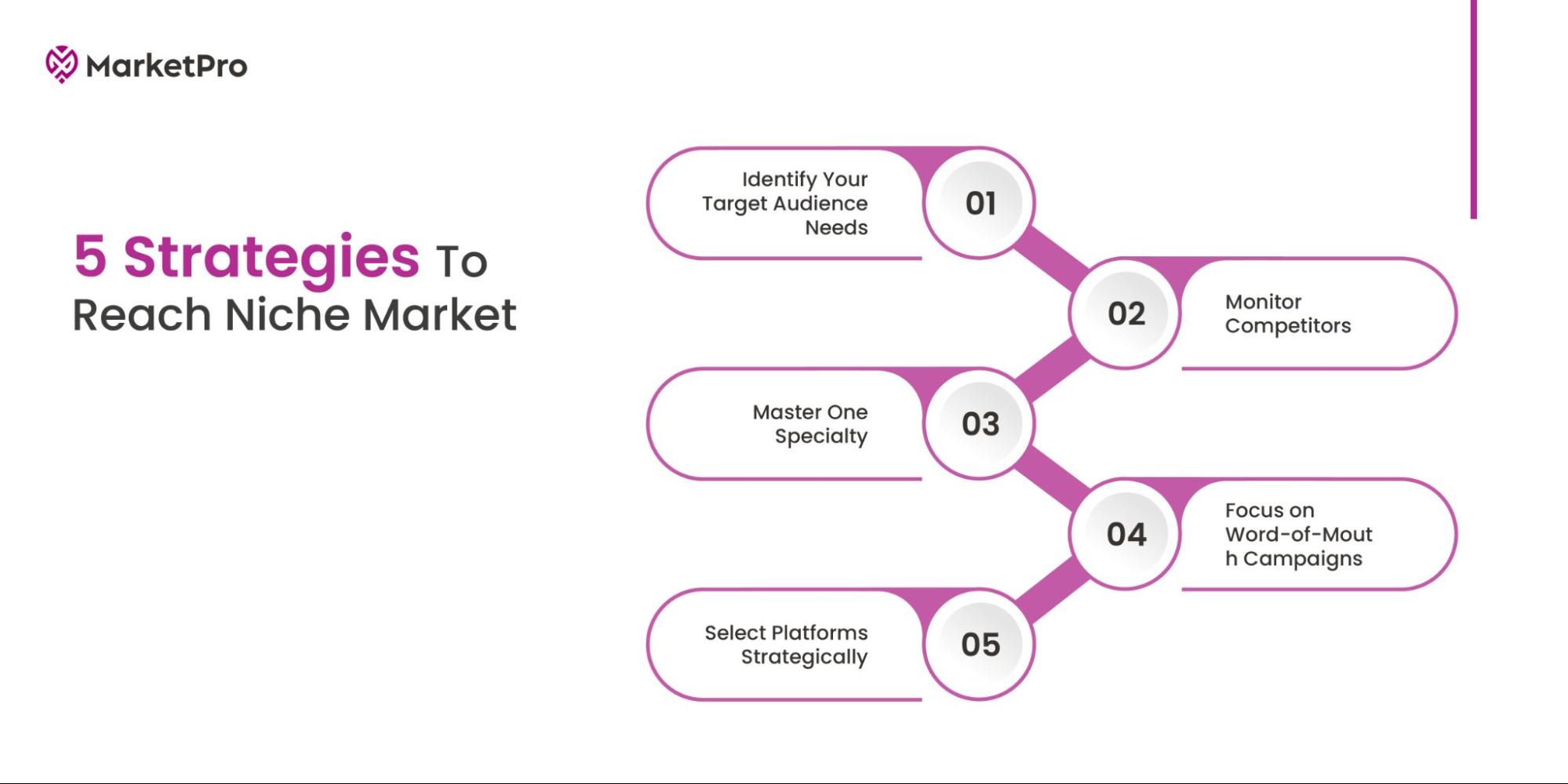Highly generic markets with expansive audiences often become overly saturated, making it challenging for businesses to sustain themselves and measure their impact. These large markets trap businesses into adopting generic marketing practices aimed at targeting everyone. However, this approach often leads to minimal effect. But what if there’s a better way?
Reaching a narrow customer base that is perfectly aligned with their offerings. Instead of playing jack-of-all-trades, niching down to one segment or group helps them understand their audience, structure their position, and create cohesive marketing campaigns.
In this post, we will cover critical aspects of highlighting the power of niche marketing and the downsides of not embracing this strategy.
What is Niche Marketing?
Niche marketing involves strategies and campaigns designed to target small, narrow groups out of expansive target audiences. They detach a chunk of the market and target them based on their specific needs, demographics, and similar characteristics.
This helps them create targeted campaigns and personalized marketing messages that are highly relevant to their niche audience and reduce the odds of wasting their campaigns’ performance.

Market segmentation allows them to combine their narrow subsets of potential customers and reach them with specialized marketing campaigns centered around their brand’s unique value position, consistent with all their marketing channels.
Niche Marketing | What Makes Them Relevant in 2024?
A saturated market and mass marketing efforts have slumped business growth. To cope with these problems, businesses are becoming more niche-specific, cutting down on the generic market and being more specialized in their marketing campaigns to ensure better impact.
Conversely, studies show that users typically spend 27% more time on niche websites than general content sites.
Some of the reasons why businesses are moving towards niche marketing practices are
Better Understanding Of the Marketing Funnel
When businesses have small segments of an audience with similar characteristics and needs, it is easy for marketers to build their promotional campaigns and keep up with market demands. A cohesive target audience helps businesses gather data to create their campaigns, craft relevant marketing messages, and build clear sales funnel strategies, providing immense flexibility for their marketing operations.
Less Competition, More Opportunities
Why is niche marketing resoundingly helpful in the saturated world? Because niche marketers don’t aim to market every segment, they can avoid many factors, especially cutthroat competition. Businesses chunk their way out into more narrow and specialized spaces, which makes them specialized entities and allows them to create their unique space in less saturated spaces.
Unique and Authoritative Presence
Due to the narrow market, businesses have immense opportunities to quickly create their strong and authoritative presence. On the contrary, a broad market audience takes a toll on business growth and takes considerable time to map their presence. Niche digital marketing’s small market cap allows it to help businesses through word-of-mouth marketing and create a strong, powerful community that shares its concerns with businesses while adding positive reviews, which makes a vibrant ecosystem.
Strategies To Hone Niche Marketing Expertise
Niche marketing is easier to conduct than mass marketing. However, businesses must still prepare strategies to improve their B2B digital marketing efforts to reach niche markets.

1.Comprehensive Audience Analysis
Niche segments require businesses to focus more on understanding their target audience and analyzing their pain points, needs, and problems. Some of the aspects that include in researching audience:
- Analyzing user’s online behaviors such as purchasing behavior, interactions, and interest in their products.
- Embrace social listening tools to understand what their customer’s beliefs are and measure their sentiments.
- Engage in niche forums and communities to start meaningful conversations and get insights regarding their audience’s preferences and needs.
“Commit to a niche; try to stop being everything to everyone – Andrew Davis”
2.Excel In One Thing
Businesses must narrow their presence and operations to build expertise and authority in the niche market. They must create a unique image, focus their efforts on one group, and become masters in their space. General advertising and branding practices won’t help businesses excel in niche markets.
Fintech marketing have found that it’s better to take one subset of the market and put consistent measures in place to target their audience effectively instead of hitting aimlessly in the air and ending up being mediocre and average in customers’ eyes.
3.Keep Tabs on Your Competitors
Brands must keep tabs on their competitor’s strategies despite researching their niche audience. They need to identify core elements like:
- What’s their Unique Selling Proposition (USP)? Why do their customers choose them over others?
- Do they outsource SEO services and how do they play with niche-related keywords?
- How do they approach influencer marketing, and how much do they invest in these activities?
However, these strategies are not encouraged to be copied. Still, it’s always advisable to learn from established players and see what methods they are currently using that prove invaluable for their brands.
4.Focus on the Power of Positive Words
In today’s digital age, words can make or break any brand’s image. Especially in niche marketing, considering the narrow space and small volume of target audience, a bad word or experience can quickly deteriorate a brand’s digital presence.
However, businesses can take advantage of this situation, too. Businesses need to focus on getting more social proof and improving their brand’s image with positive experiences. Conversely, due to a narrow target audience, their brands can easily benefit from word-of-mouth campaigns and recommendations.
5.Choose Marketing Platforms Wisely
After researching their target audience and creating ideal buyer personas, businesses have developed a clear understanding of their niche audience. By seeing their audience, they can decide which marketing platforms are more suitable for them to reach and where their target audience mostly resides.
With the help of martech services, they can predict which platforms their brands get better responses from. Conversely, it also helps them integrate paid advertising into social media platforms to amplify their reach and social impact.
Niche Marketing Examples
Peloton
One niche marketing example in the fitness industry is Peloton. Their target product was cycling, and they created a subset of cycling outside the fitness niche. Peloton successfully surged its sales to 66.6% when COVID hit 2.76 million subscribers by focusing deeply on audience needs, creating a strong brand story, and using content to build a sustainable luxury brand and community.
Whole Foods
Whole Foods cleverly narrows its niche for organic food lovers. Their brand focuses on providing natural food and spreading awareness around organic foods. They niche their market by becoming the most prominent players in the organic food industry and strengthening their relations with their customers by posting healthy cooking techniques and diet plans on their blogs and YouTube platforms.
Nomatic
Nomatic is a niche subset of the traveling industry that provides high-quality travel bags, suitcases, and backpack accessories. With the rise of freelancers and remote jobs, they aim to target the narrow audience that frequently travels and wants to carry all their personal and work belongings on their backs. They serve as a perfect destination partner for those who constantly need to bring their work with them.
Wrapping Up: The Future of Niche Marketing
Niche marketing will only grow, with tight race and saturation among the same categorical industries. Businesses are constantly searching to narrow their brand’s offerings, starting from targeting a narrow space and then working their way up. Enterprises leverage niche marketing by excelling at one group, establishing their unique and strong presence while making deep connections with their customers. Digging their niche market and conducting cohesive marketing strategies for the longer run can sustain their brand growth for ages.
At Market Pro, businesses can effectively reach their niche markets through advanced segmentation, enabling powerful brand stories and content that builds a sustainable community.

